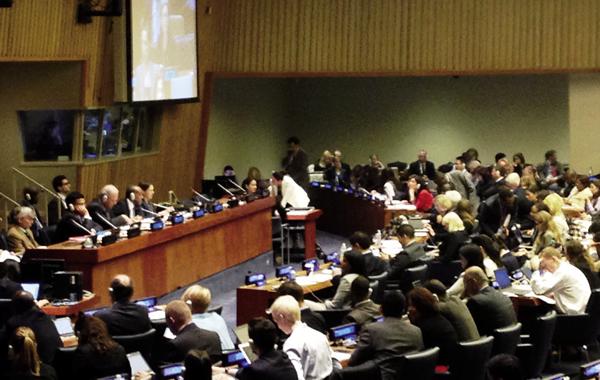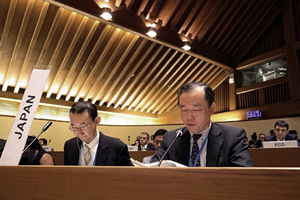Feature
The Challenges of the Ministry of the Environment, Japan for Post-2015 Development Agenda
Post-2015 Development Agenda will be a set of new global development objectives after 2015. Intergovernmental negotiations are under way in order to adopt this Agenda in September 2015, and the Ministry of the Environment, Japan (MOEJ) has actively contributed to this process. The core of the Agenda is Sustainable Development Goals (SDGs) including many goals and targets that are closely related to the environment. Therefore, we will continue to promote active practices of SDGs in Japan and international cooperation catching the trend in the environmental field, and this includes the efforts to diffuse Japanese technologies and experiences that support sustainable consumption and production.

The Post-2015 Intergovernmental Negotiations (Follow-Up and Review) in New York, USA, May 18-22, 2015.

Mr. Soichiro Seki, Vice-Minister for Global Environment, Ministry of the Environment of Japan, made a statement stressing the importance of the implementation of Post-2015 Development Agenda at the Asia-Pacific Forum on Sustainable Development in Bangkok, Thailand, May 21, 2015
2015 is a very important year for mankind to take a new step towards a sustainable society. Specifically, Post-2015 Development Agenda, a set of new global development objectives after 2015, will be adopted in September 2015, so that animated discussions are taking place at UN intergovernmental negotiation conferences. MOEJ has contributed to such intergovernmental negotiations. In addition, Japanese high officials have actively participated in various UN conferences on the sustainable development in order to have talks with pivotal persons and to form the networks with other countries. The core of the Agenda is the Sustainable Development Goals (SDGs), and its draft was published in July 2014. SDGs, which consist of 17 goals and 169 targets, fully cover three aspects of sustainable development (the economy, society and environment), and these are universal development objectives and applied to all developing and developed countries without any distinction. We recognize that the agreement on SDGs will be a good start to achieve sustainable society surmounting an existing view: categorizing the world into developing countries and developed countries.
17 goals in SDGs are roughly categorized into 3 groups below.
- ①Goals that similar agreements already exist and the specific targets need to be discussed in process of such agreements (e.g. Goal 13. Climate Change)
- ②Goals that similar agreements already exist and the specific targets are set in reference to contents of such agreements (e.g. Goal 15. Biodiversity)
- ③Goals that similar agreements do not exist so that SDGs are expected to secure their international importance (e.g. Goal 6.Water, Goal 7.Energy, Goal 12.Sustainable Consumption and Production)
We believe that goals that are categorized in Group 3 are particularly fundamental in the environmental field. Therefore, the goals and specific targets in this group must be clearly established through active discussions at intergovernmental negotiations, and their importance need to be globally recognized.
Among 17 goals, 12 goals shown in the figure are related to the administration of the Ministry of the Environment, and we have worked to connect our environmental policies to each target. Assuming that SDGs will be a basis of national policies, we recognize SDGs as a momentum for the proactive practice of the environmental policies. Mainstreaming SDGs in the provinces is a great challenge. In order to diffuse SDGs in the entire nation, it is vital to associate outstanding efforts in the provinces to the targets of the SDGs playing up their importance. Therefore, we are willing to cooperate with the stakeholders such as local governments and enterprises for the nationwide practice of the SDGs.
We are planning to set an example in the international cooperation according to the idea of SDGs. For instance, as a co-leading agency of the Sustainable Lifestyles and Education Programme, the Ministry of the Environment shares low-carbon technologies and experiences with other countries mainly in Asia/Pacific region (See Current Topics for more information). This programme is one of the UN 10-Year Framework of Programmes on Sustainable Consumption and Production in goal 12 (①Sustainable Public Procurement ②Consumer information ③Sustainable Tourism ④Sustainable Lifestyles and Education ⑤Sustainable Building and Construction ⑥Sustainable Food Systems), and all of them were initiated in 2014. For international contribution to the achievement of SDGs, the Ministry of the Environment will continue to expand and strengthen the network of international cooperation catching the trend in the environmental field.
More Information:


